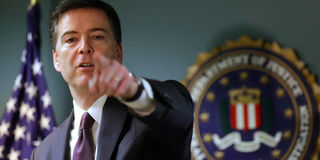Ex-FBI chief says he could not trust Trump to tell the truth

What you need to know:
Trump and his team, Comey said, told "lies, plain and simple," about him and the FBI in an effort to cover up the real reason for his sudden sacking last month.
Washington. Former FBI director James Comey on Thursday used a dramatic appearance before a national audience to sharply criticise the character of the president, accusing Donald Trump of firing him over the Russia investigation and then misleading the public about the reasons for the dismissal.
Trump and his team, Comey said, told "lies, plain and simple," about him and the FBI in an effort to cover up the real reason for his sudden sacking last month.
Comey said that after one particularly odd private meeting with the president, he feared Trump "might lie" about the conversation, prompting him to begin taking careful notes after each encounter.
Comey revealed that after he was fired, he leaked notes on his interactions with Trump to the media, hoping that sharing the information would prompt the appointment of a special counsel to investigate the administration over possible links to Russia.
"It's my judgment that I was fired because of the Russia investigation," Comey said. "I was fired, in some way, to change - or the endeavor was to change the way the Russia investigation was being conducted."
Comey's testimony threatened to deepen the legal and political crisis engulfing the White House, which has struggled to respond to growing questions about the president's conduct.
"I can definitely say the president is not a liar," said White House deputy press secretary Sarah Huckabee Sanders after the hearing. "I think it's frankly insulting that that question would be asked."
Over nearly three hours of testimony in a packed hearing room, Comey grimly recounted the events that he said showed the president sought to redirect the Russia probe away from his former national security adviser, Michael Flynn, and get the FBI to publicly distance the president himself from the probe.
As Comey spoke, most senators on the dais sat spellbound. Republican members of the Senate Intelligence Committee sought to soften Comey's version of events, noting that Trump never ordered him to drop the Flynn investigation but merely "hoped" he would. Democrats tried to build a case that Trump had obstructed justice by firing Comey.
Pressured by the administration to focus on the president's legislative ambitions rather than the politically consuming investigation, Republican leaders defended the president after the hearing, with House Speaker Paul Ryan (Wis.) casting Trump as a political novice who isn't "steeped in the long-running protocols" of Washington and is "just new to this."
Comey declined to say whether he thought the president had obstructed justice, saying that was a determination to be made by Special Counsel Robert Mueller III.
In response to Comey's testimony, Trump's personal lawyer, Marc Kasowitz, released a statement saying the president "never, in form or substance, directed or suggested that Mr. Comey stop investigating anyone."
Kasowitz also accused Comey of trying to "undermine this administration with selective and illegal leaks of classified information and privileged communications."
The hearing, broadcast nationally by at least 12 television networks, was held in a cavernous space in the Hart Senate Office Building with hundreds of seats to accommodate the intense interest. Several lawmakers who do not serve on the committee took seats in the audience, a rarity on Capitol Hill. Most were Democrats eager to hear Comey's claims of presidential impropriety.
Inside the hearing room, people audibly groaned or gasped when Comey said he had "no doubt" that Russian government officials were behind the hacking of the Democratic National Committee last year.
Anticipation for the hearing stretched far beyond the Hill. Sen. Joe Manchin III, D-W.Va., walked into the hearing with a binder that included 20 of more than 600 questions he said were submitted to him by constituents.
Comey began his testimony by saying he became "confused and increasingly concerned" about the public explanations by White House officials for his firing on May 9, particularly after the president said in an interview that he was thinking about the Russia investigation when he decided to fire him. (Washington Post)




